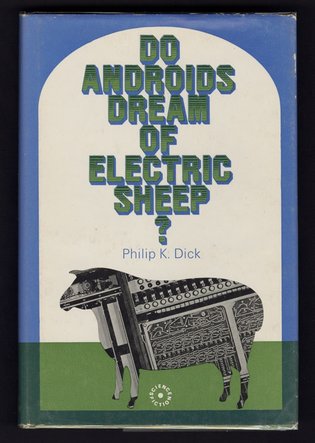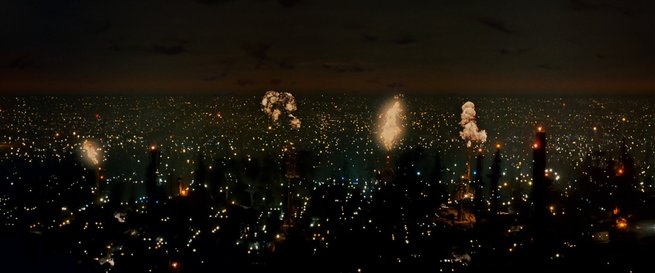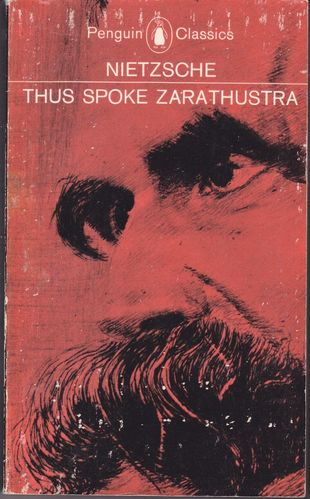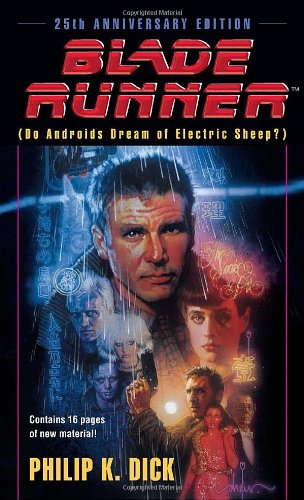|
This essay, which appeared originally in Dissenting Views, discusses the film Blade Runner as contrasted by Philip K. Dick's original novel. Given the anticipation surrounding the remake, it seemed a good time to unearth it for the blog. Philip K. Dick’s novel Do Androids Dream of Electric Sheep? proposes that even in 2021, Americans will be driven by a bourgeois desire to fit in, and surpass, one’s neighbors. Rick Deckard, the book’s protagonist, owns an electric sheep. He can’t afford to replace it with a real one because they’re too expensive; in a world in which most animals have been killed in a chemical world war, animals have become a status symbol. As far as his neighbors are concerned, the deception works – but this hardly satisfies him. He refers to the sheep as "a mere electric animal," a cover to reassure the outside world. Meanwhile, the creature’s artificiality eats at him. Every day he goes to work -‐-‐ which entails killing humanoid androids – all the while dreaming of the real sheep that one day will be his. At the end of the book, when Deckard has suffered through a record-‐breaking day (for android-‐killing) he finds himself in a kind of spiritual quicksand, wandering on the outer edges of the city. He sees desolation in all directions, without any sign of life. Then he comes upon a frog; cradling it, he manages to carry it home with him to his wife. He goes away to take a shower, leaving the frog in his wife’s hand. She examines the frog and discovers that it is artificial. She also decides not to tell her husband. At that moment, Deckard’s moment of spirituality is defined by artificiality, as it has been at every turn. In the film version of Dick’s novel, this notion of artificiality is carried over to its protagonist. Rather than being a kind of human Virgil in a tour of all things android, Deckard is an android. It is specifically this artificial quality that unnerves or even bores some about the film. Roger Ebert referred to it as a picture inspired by "the dreams of mechanical men" and most critics have largely agreed with this assessment. Blade Runner, if discussed at all, is discussed in terms of its enormous influence in set and production design. The technical aspects are described in triumphant terms even as the story is described as incoherent, or simply tedious. It’s certainly true that the film has been enormously influential; in fact, its influence is all-‐encompassing to the point that it has become cliché. However, the movie flopped in its first release, partially because of some insipid decisions (adding voice-‐over narration and cutting a few key scenes) that destroyed the continuity. Ridley Scott, the film’s director, rectified these changes with his recent re-‐release cut, and the thematic sense has been restored. It is this latter cut that I will be referencing at various points in this essay.  Blade Runner is a film which lacks a sense of audience-‐to-‐protagonist identification, and the major problem is Harrison Ford’s excellent performance. Ford, now and then, has gained audience acceptance as a Star, rather than an actor. Ford has specialized in archetypes: Han Solo, Indiana Jones, Jack Ryan. When he has attempted to stretch himself, as in this film or The Mosquito Coast, the films have not done well – despite his superior performances. Simply put, audiences have not shown their enthusiasm for him as anything other than a two-‐fisted Everyman. While Ford was not happy about playing an android (as reported in Paul Sammon’s Future Noir: The Making of Blade Runner) he did a fine job of it. His deadpan tones and curiously jerky head movements betray inhumanity; even when he performs his characteristic smirk, he does it with an exaggerated head-‐tilt, skewing the expression from charming to off-‐putting. His apparent disinterest led to audience disinterest, since they could hardly identify with what seemed to them an android Harrison Ford. What immediately strikes the viewer is the great disparity in style and energy between Ford’s Rick Deckard and the lead android Roy Baty, played by Rutger Hauer. Hauer’s performance has been castigated for being over-‐the-‐top, too overtly theatrical; in truth, the performance is less theatrical than operatic. Once again, what should be remembered is that Hauer is an android in the film, and what plays out in the final sequences is an inhuman reaction to the realization of imminent mortality. It is Hauer’s Roy Baty that I wish to focus on, as it seems to me his presentation is the key to understanding the last half of the picture. Blade Runner has a similar theme to Dick’s novel, but a vastly different conclusion; where the novelist is interested in the lies and artificiality at the heart of spirituality, the filmmakers are interested in value creation. To this extent, the influence of Nietzsche is apparent. I hesitate to discuss Nietzsche in this context, if only because he has been misunderstood and misrepresented by artists too often; artists have often adopted him because of his penchant for bold declarations and because he is easier to read than Kant. Still, it’s almost impossible to ignore the strong Nietzschean flavor of what goes on in the last act of Blade Runner; Baty’s epiphany is clearly meant to parallel the Ubermensch, in English the Superman or Overman. The Overman (or Superman) in Nietzsche is the man who creates values for himself, who lives by his own genius and rejects all forms of weakness and religion. He makes his own morality, a master morality as differentiated from the "slave morality", i.e. the perspective of humility, tranquility, etc. The Overman does not help the poor or infirm, he ignores (and is largely disgusted by) them, because he has better things to do. Bertrand Russell once described Nietzsche’s philosophy by quoting a passage from King Lear about committing acts which are unknown but "will be the terror of the earth." While somewhat unfair, this does carry the flavor of his pronouncements. It is Nietzsche who popularized the notion that "God is dead" in Thus Spake Zarathustra: the complete phrase is "God is dead, and it is we who have murdered Him."
After the android demands more life, Dr. Tyrell reveals his limitations – he cannot give him more life, but only homilies about living life to the fullest. God’s power is ultimately restricted, unable to bestow immortality or give meaning to death. Baty, penitent, seeks punishment from God – "I’ve done questionable things," he says. Dr. Tyrell ignores this, proud of his creation and eager to please: "And also great things. Revel in your time." Baty smiles and then murders him by tearing at his eyes – destroying a God who could not see the evil in his creation. He then murders John Sebastian offscreen, as the film cuts to a shot of Baty standing in some sort of spacecraft, hurtling ahead with the stars behind him. It is as if he is beginning a new and terrible journey, while also perhaps serving as a flashback to his trip from the Moon to the Earth. The moment is positively Wagnerian; shot from below, light shining on his face, at this moment Blade Runner reveals that the hero is actually Roy Baty, and that he has discovered freedom in the capacity to create his own values. Tyrell is dead, and it is he who has murdered him. Baty, rapidly dying, and apparently losing his sanity, engages in a final confrontation with Deckard, who has been forgotten for some time. Deckard single-‐ mindedly seeks to destroy him, while for Baty everything is a game, in which the rules are only to experience as intensely as possible. Once, in the middle of the combat, Baty sticks his head out of a window and closes his eyes, feeling the rain strike his artificial skin – a momentary intermission in the duel. He tries to involve Deckard in the game: "That wasn’t very sportsmanlike," he tells him, after Deckard has struck him with a pipe, "Aren’t you the good man?" This reversal of good and bad, using the words that describe morality in their ordinary sense but in the inverse, is also reminiscent of Nietzsche’s tactics. Then, almost expiring, Baty pushes a spike through his hand to stop an apparent short-‐circuit of some kind; the parallel here with Christ is obvious, although it is something of a send-‐up. Baty has replaced Christ with himself, which is further shown by his rescue of Deckard as the blade runner is about to fall off a building. On a whim, Baty gives redemption, saving the man’s life because he chooses to do so – where he had murdered before. In either case he is adopting the power of God. Then, in his final moments, he reflects on his time: "I’ve seen things you humans wouldn’t believe. . .all of these moments will be lost, in time, like tears in rain." A dove he has captured flies free, and the metaphor (of course) is to an ascending soul. However, there is no soul, and death is permanent – as Baty’s concluding speech asserts; one can choose only the manner of one’s life. Deckard rushes home to find his lover Rachel, whom he knows to be an android, and discovers that he himself is one as well. He appears to absorb this with knowing resignation, as he remembers the phrase uttered by a street cop (played by Edward James Olmos): "It’s too bad she won’t live, but then again, who does?" Indeed. Deckard escapes with Rachel, having apparently learned a lesson from Baty about love and time. Deckard, who had been pushed around by everyone, ordered to kill, decides to take control of himself and escape. We are ignorant of the results of his decision, but it hardly matters. Blade Runner is about one’s choices, about the realization of mortality, and the desire for independence. God is dead, life is mechanical, and the only escape lies in the assertion of will.
0 Comments
Your comment will be posted after it is approved.
Leave a Reply. |
AuthorThis is Joe Green's blog. Archives
August 2021
Categories |



 RSS Feed
RSS Feed
